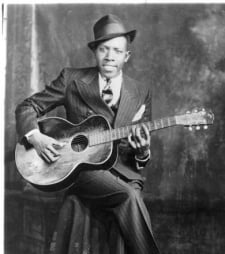Robert Johnson
Contents |
Foreword
To do a true portrait of the legendary Robert Johnson is a nearly impossible task, since his story is highly influented by rumours, tales and stories by people who actually never met him. His importance in the music history is rather as a source of inspiration for artists like Muddy Waters, Elmore James, The Rolling Stones, Jimi Hendrix, Eric Clapton, Led Zeppelin and others, than beeing a recognized artist of his own. (in his own time) He was almost unknown until the beginning of the 60's when the first/only LP was released, although some enthusiast were collecting his recordings from 1936-37. The most pretentious work about his life was made by John P. Hammond (son of blues artist John Hammond), which resulted in a documentary movie "The Search for Robert Johnson"
Introduction
Robert Johnson is most famous to the history in music by contributing songs like "Sweet Home Chicago", "Dust my Broom", "Cross Road Blues" and "Love in Vain". He has also been known to the general public through films like "Crossroads" and "Can't You Hear the Wind Howl?". He is considered as one of the founders of the "Delta Blues", and is known to be the one who sold his soul to the Devil in the "Devil Legend".
Early Life
Robert Johnson was born born in Hazlehurst, Mississippi, probably on May 8, 1911 or 1912. He was the son of Julia Dodds and Noah Johnson, even that Julia was married with an afro-american landowner (Charles Dodds) that was driven away by a lynch-mob due to a dispute with a white landowner. He was later sent to Memphis by Julia to stay with Dodds, but returned to his mother in about 1919, then living in the neighbourhood in the area around Tunica and Robinsonville, Missisippi.
Very little is known about Roberts early life, even that he was said to be playing the harmonica and the jew-harp by one school mate. He had a nick-name, "Little Robert Dusty", and he attended school during the years 1924-27. Probably he was doin' well at school, since his signature on his first marriage certificate shows that he had some proper education. After school he changed his surname to "Johnson", although he was registered in school as "Spencer" - the new surname Dodds took when he moved to Memphis.
Getting into music
The blues musician Son House, who lived in Robinsonville with his music associate Willie Brown, remembered that Robert used to pester them with questions and was trying to imitate their performances. (Son House was earlier imprisoned for killing a man in a fight and been released around 1929, he was then "rediscovered" in the 60's and most of his records are from that time. He is also known to be playing with the bottleneck. ed.note.) Robert is also said to have been practised in a graveyard under guideance of the obscure bluesman Ike Zinneman, and when he went back to the juke joints and parties where his role models played, they were simply amazed by the talented singer/guitarist. He surely was influented by Son House, but also Skip James and Charley Patton must have been a source of inspiration.
The Delta blues
Robert was one of the "Delta Blues" singers, a musical style developed in the area between Memphis in the north and Vicksburgh in the south (USA). The area is famous for it's fertile land, and a lot of slaves were working there before the abortion of the slavery. The "Delta Blues" were a mix of field hollers, chants, fiddle tunes and religious music that were played and sung on guitar, not seldom with a bottleneck. Muddy Waters and Howlin' Wolf was two musicians that grew up in the Delta, but later moved to Chicago - forming the style which to be known as the "Chicago Blues".
King of the Delta Blues Singers, the 1961 album that influenced the decade's entire blues revival. A 1990 reissue on CD as The Complete Recordings includes every known Johnson track in existence, photos and notes.
Even smaller title
Duis aute irure dolor in reprehenderit in voluptate velit esse cillum dolore eu fugiat nulla pariatur. Excepteur sint occaecat cupidatat non proident, sunt in culpa qui officia deserunt mollit anim id est laborum.
The Devil Legend
The legend about a musician selling his soul to the devil and in return gets super-natural gifts in music, appeared even before Robert Johnson. This may have been due to that the religious people associated the Blues with the devil, since it was played in small illegal joints along with alcohol and an obscyre living. The first appearence in recorded music was by Clara Smith - "Done Sold My Soul To The Devil (And My Heart's Done Turned To Stone)" in 1924. The legend has then developed over time, and Robert has been a front-figure as long as the legend developed.
Fourth Headline
Lorem ipsum dolor sit amet, consectetur adipisicing elit, sed do eiusmod tempor incididunt ut labore et dolore magna aliqua. Ut enim ad minim veniam, quis nostrud exercitation ullamco laboris nisi ut aliquip ex ea commodo consequat. Duis aute irure dolor in reprehenderit in voluptate velit esse cillum dolore eu fugiat nulla pariatur. Excepteur sint occaecat cupidatat non proident, sunt in culpa qui officia deserunt mollit anim id est laborum.
Related GMC Lessons
(this is a speical headline that is optional)
See also
(this is a speical headline that is optional)






